We know when our dogs are sick as their best buddies. An unwell dog will display human-like symptoms such as weakness and exhaustion. You may believe your dog’s lack of energy is due to laziness, but it might indicate thyroid illness. How much will it cost to have a veterinarian check your dog’s thyroid?
The expense involved in diagnosing thyroid is not very significant. The testing fee ranges on average between £40 and £140. In most cases, treatment is regarded to be tolerable as well. The costs of medicine on a monthly basis are often in the region of £15 to £40.

This article will help you understand the cost of a dog thyroid test and the many treatment choices available so that your dog may return to being the joyful, playful self that it once was.
What Exactly Is Thyroid Gland Disorder?
The thyroid glands, which are found in the neck, are responsible for the production of hormones essential to the body’s proper functioning. Thyroid illness, sometimes referred to as hypothyroidism typically produces inadequate thyroid hormone in canine animals. Hypothyroidism is more prevalent in middle-aged pups, especially those of medium to big breeds. It has no differential effect on the sexes. The loss of the thyroid gland is the primary factor in most hypothyroidism seen in canines.
Dog Thyroid Gland Disorder Symptoms
The thyroid plays an essential part in the creation of hormones and assists in the functioning of other hormones, which can result in various symptoms. The following is a list of signs that your pup could exhibit:
- Slowed metabolism
- Lethargy
- Lack of motivation to exercise
- Weight gain, no appetite change
- Difficulty retaining body heat
- Hair loss
- Hair with a dull coat
- An excessive amount of shedding
- Pain, redness, infection, or odor coming from the ear
- Skin infections
- Regurgitation
Types
It is usual practice to distinguish between two distinct forms of thyroid diseases.
- Hypothyroidism – a reduction in the secretion of thyroid hormones – is the most common disorder in canines. The slower metabolic rate directly results from the reduced amount of thyroid hormones. The loss of the dog’s thyroid gland causes most hypothyroidism instances. One of the less common causes is a pituitary gland tumor, which will show signs of hormone deficiency in the pituitary gland.
- Hyperthyroidism, characterized by a rise in the secretion of thyroid hormones, is uncommon in dogs. In contrast to hyperthyroidism, which lowers the metabolic rate, hypothyroidism accelerates it. This particular form of thyroid dysfunction is characterized by a reduction in body weight, an increase in hunger, and a quickening heart rate.
Dog Thyroid Disorder Diagnosis
When it comes to diagnosing thyroid in canines, there are a few different options:
- Physical exam
- Blood panel – although this may indicate signs of hypothyroidism, the findings of this test can be impacted by a variety of other diseases.
- Lab testing to monitor thyroid hormone levels; your vet may also prescribe thyroid-stimulating hormone to confirm hypothyroidism.
What Is Thyroid Testing?
A blood test is performed as part of a thyroid test to examine how well the thyroid gland works. This gland is responsible for producing thyroid hormone, an essential hormone in the control and upkeep of the body’s functioning. In any dog that is sick, a thyroid test is recommended. Healthy dogs, especially the elderly, benefit from thyroid test results, which check for illness or disease. The presence or absence of normal findings might assist in establishing overall health or ruling out specific disorders.

There are no practical reasons why you shouldn’t do this test. However, you should be careful if the pup has a propensity for heavy bleeding. After the sample has been collected, additional precautions should be taken to check that the area used to collect the sample is not bleeding excessively.
What Does a Thyroid Examination Show?
A thyroid test can determine blood thyroid hormone levels. If your pups have high thyroid hormone levels, their thyroid gland produces too much of it, which is often associated with a thyroid tumor. When levels are low, it indicates that the thyroid gland is not working correctly. This is typically related to diseases of the immune system that result in the destruction of the thyroid gland by the body.
How Is Thyroid Test Done?
Your vet must collect blood in a specific glass tube to administer a thyroid test. After the blood sample is allowed to coagulate, it is transferred to a centrifuge and separated into its serum and blood clot components. After the serum has been extracted, it is delivered to a laboratory for examination. The blood clot is thrown away as waste. The majority of veterinarians use laboratories located outside of their own practices.
A veterinary thyroid test usually takes 40 to 60 minutes. If the sample is sent to a different laboratory, the turnaround time for the findings might be between one and two days.
Cost of Testing the Dog’s Thyroid
You must know what your dog is being tested for dog thyroid test costs. Screening procedures may vary from one medical practitioner to the next, however the majority of thyroid blood testing checks for levels of the following hormones:
- T4 (Thyroxine)
- T3 (Triiodothyronine)
- Free T4 (Free thyroxine)
- TSH (Thyroid-stimulating hormone)
- TgAA (Thyroglobulin autoantibody)
Check out these words for dog thyroid tests. The thyroid is liable for producing T3 and T4, both of which are necessary for the normal functioning of the metabolic system. When looking through the test results for your pet, veterinarians will look for any anomalies in the amounts of these hormones.
Typical Costs for a Thyroid Test for Dogs
The cost of testing a dog’s thyroid can range anywhere from £40 and £140 on average. To diagnose hypothyroidism in your dog, your doctor will conduct various blood tests. In addition, certain veterinarians could perform urine tests to rule out any other potential diagnoses.
If your vet does all these tests on your dog, you’ll pay £140; when you add on the typical office charge of £50, your total jumps to £190.
- Do Dogs Get Sad When You Yell at Them?
- Does Walking Your Dog Trim Their Nails?
- Why Does My Dog Sit On Me When I’m Lying Down?
Costs by Top Breeds
The price of having your dog’s thyroid checked usually does not change depending on the breed. The veterinarian who cares for your dog will perform the same tests on him or her regardless of your pet’s age, breed, or size. Some canine breeds may be more predisposed to certain conditions than others.

The following dog breeds as having a greater chance of developing thyroid gland disorders than others:
- Golden Retriever
- Miniature Schnauzer
- Dachshund
- Doberman Pinscher
- Airedale Terrier
- Cocker Spaniel
Larger dogs are more likely to acquire thyroid problems than smaller and toy types. You may be more likely to pay for thyroid testing if you own a dog that is of a medium-to-large size or is of one of the breeds listed above. On the other hand, any breed is susceptible to developing thyroid problems, and the expense of testing will be the same regardless of species.
Minimal Cost
There is a possibility that you may fight the urge to save money on testing by requesting that your veterinarian do only a single blood panel on your pup. Thyroid disease in dogs is tricky to detect since its symptoms resemble those of other conditions. It’s advisable to do all possible tests to determine your pup’s disease.
If you choose the lowest testing option and dismiss others, you’ll spend £70-£90 for the test and office costs. If your dog has thyroid issues and is on medicine, you may pay £40-£65 for testing to monitor T4 levels while determining the proper dosage.

Doctor of Veterinary Medicine (D.V.M.) at Nation Taiwan University,Master of Science (M.S.) in Biomedical Engineering at National Taiwan University of Science and Technology




